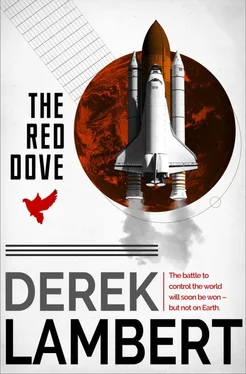All as ineffectual as gossamer floating in the breeze if you could penetrate the silo through a micro chip as small as a baby’s thumbnail.
‘Maybe,’ said Peslyak reflectively, ‘we could even launch the Minuteman prematurely.’
Moroz said crisply: ‘If this works we could probably launch every damn missile in America – and contaminate the world.’
Vlasov interrupted. Addressing Peslyak, he said: ‘Viktor has relayed to me your remark about diverting the missile on to Washington. The object of this exercise, my dear Yuri, is to control space not to destroy the globe. I have assumed your remark was flippant, although in the worst possible taste. The President,’ he added smoothly, ‘has assumed the same.’
Peslyak glared at Moroz and Yashin thought: ‘I am listening to a nightmare. If this power I have at my fingertips got into the wrong hands—’
Massey said: ‘Hit it.’
Yashin made contact.
A fragment of a pause.
He was through.
He began to inject his poison.
As he transmitted he resurrected his own vision of the future. A world in which health, energy and food problems were all solved by micro chips. In America the Cyber 205 could perform 800 million functions in a second, probably more by now. They had smart machines that could both speak and understand spoken words, albeit slowly. One day they’d have machines that talked to each other.
And here I am sabotaging the inertial guidance system and solid propellant ignition of a missile designed to carry a thermonuclear warhead across continents.
‘That’s it,’ he told the four men gathered around him as he completed the INPUT.
Vlasov said: ‘Until tomorrow.’
They left the room.
It was done.
At 09.23 the following morning, when the night cloud and fog that frequently blankets the area had lifted, the United States Air Force embarked on its 483rd launch from Vandenberg.
They needn’t have bothered about the cloud base. The rocket had ascended to only a few thousand feet when its thrusting flames suddenly died.
The rocket faltered and plunged into the Pacific two miles from the shore.
Associated Press and Reuters had the story within an hour enabling the afternoon newspapers to plaster it across their front pages. True, the missile hadn’t been armed with a warhead but what, they speculated, would have happened if it had been? Vandenberg, the Pentagon and the White House were inundated with Press calls but no one pursued the story as zealously as the Washington bureau of Tass, the Soviet news agency.
When the story landed in the head office of Tass on Moscow’s Boulevard Ring the top teletype and three photocopies were rushed to Dzerzhinsky Square.
Vlasov read and re-read the report sitting at his desk. So it had worked. They had penetrated the United States’ military space programme: while Russia dispatched an armoury into orbit America would be crippled.
Eventually, of course, the penetration would be traced. But by that time it would be too late. The military shuttles primed to distribute spy and killer satellites equipped with beam weapons, interceptors and possibly orbital nuclear bombs would be incapacitated.
Unless this was an elaborate CIA set-up. But for what possible reason? Vlasov frowned, then, remembering the photographs on the wall of his study, thrust aside the suspicion; for the time being at least. If his luck held he would soon be able to visit his middle-aged children and explain.
He picked up a telephone and called Moroz. ‘It worked,’ he said.
‘It worked,’ Reynolds told the President on a scrambled line.
‘Glad to hear it, George. Bring me the details at six o’clock this evening.’ The line went dead.
The details were simple enough, Reynolds reflected sipping a plastic cup of coffee in his office at Langley. And relatively cheap.
All they had done was to launch an obsolete Minuteman denuded of most of its equipment with only enough propellant to take it a few thousand feet into the air. Although, of course, none of the leaders of the protests organised around the world was aware of this.
The danger, as always, was the human factor. Technicians involved in the deception had been kept to a minimum; each had been exhaustively screened and sworn to secrecy; none knew the motive behind the exercise. Two known KGB informants normally used to pass on misinformation had been deployed elsewhere.
However, there was always a risk. If the Minuteman deception was blown then the spectacular was blown. And Massey was dead.
Reynolds finished his coffee and paced his office in the modern block on the highway ringing Washington. It was a spartan place furnished with Government-issue desk, chairs and filing cabinets but at least, unlike the office of his Russian counterpart, Nicolay Vlasov, it overlooked trees.
Reynolds respected Vlasov. If the spectacular was aborted it would be his doing. And I will be the sacrificial lamb of the congressional inquiry. Vlasov versus Reynolds… President versus President… Sedov versus Massey… Department V surveillance versus… Who?
Brasack was dead and, now that the shell of the ancient Minuteman had been fired, the first priority was to find a replacement. Otherwise Massey had no way of communicating development.
Supposing the Russians decided to launch their shuttle prematurely, supposing Talin agreed to defect, supposing we knew nothing about it…
Reynolds buzzed his intercom and told his secretary to summon a cypher expert from the Office of Communications to encode a Telex message to the United States Embassy in Moscow.
The American Embassy in Moscow is located on Tchaikovsky Street and looks like a large, bankrupt hotel. It stands flush with the pavement and there is an arch in the centre of the façade, guarded by two militiamen, which leads into a courtyard; at one corner of the building stands a KGB post manned by four operatives. The edifice owes nothing to the spirit of Tchaikovsky.
The brain centre of the CIA and other intelligence agencies is often assumed to be the offices of the military attachés. Wrong. Intelligence is indeed collated in these sections but it is superficial stuff; attachés are far too obvious, accredited spies who at ceremonial occasions are more the stuff of Gilbert and Sullivan than John Le Carré. The strong meat of the CIA operation is contained in other departments and, as with the KGB – intelligence agencies are great plagiarists – seniority bears no relation to diplomatic status; a lowly third secretary in the commercial section could in his clandestine way wield more power than the Ambassador himself.
The CIA head of operations in Moscow was ironically a First Secretary in the Information Department. His name was Palmer, he was forty years old, with slightly oriental features and mild manners and he was on this December morning a very worried man.
A few weeks previously he had been summoned to Langley and briefed on Massey’s mission. The brief: to maintain contact but not to interfere. The operation, Reynolds had said, could produce the biggest coup ever achieved by Western Intelligence. And almost immediately Palmer had lost Brasack.
Next to China, Russia was the most difficult country in the world in which to establish agents. The restrictions on movements for one thing. Any American travelling anywhere was automatically under surveillance. He might just as well carry an ID in his hat-band spelling out SPY.
So Palmer had to enlist other nationalities. Soviet satellite states (Brasack) and Russian citizens who didn’t consider that they owed any allegiance to the Kremlin. Georgia, where corruption was a way of life, was a fertile field as was the Ukraine, particularly its western reaches which, culturally and historically, have always been at odds with Moscow. (In World War II the Ukrainian Division fought with the Germans against the Soviet Union in the hope of winning their freedom; most of them were subsequently butchered for their pains by the Russians.)
Читать дальше
Конец ознакомительного отрывка
Купить книгу












